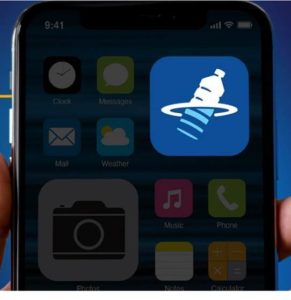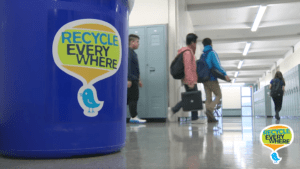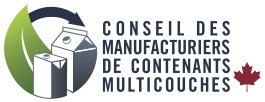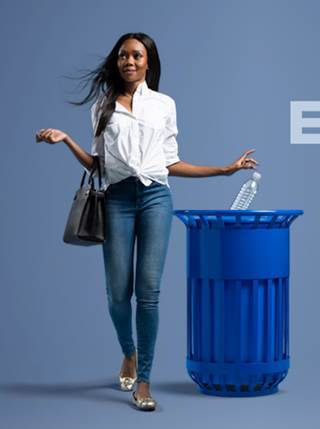The Canadian Beverage Container Recycling Association (CBCRA) was founded in 2010. The not-for-profit, industry-funded organization offers consumers a way to recycle empty beverage containers at home and out and about within the community.
 CBCRA was created when the Province of Manitoba mandated beverage producers to recover 75% of empty beverage containers. With approximately 25% – 30% of beveragecontainers consumed away from home, it was immediately clear that achieving this goal would require more than a residential Blue Box program.
CBCRA was created when the Province of Manitoba mandated beverage producers to recover 75% of empty beverage containers. With approximately 25% – 30% of beveragecontainers consumed away from home, it was immediately clear that achieving this goal would require more than a residential Blue Box program.
As a result, CBCRA created Recycle Everywhere, a comprehensive away-from-home recycling program that is both cost effective and convenient. Currently, the program runs exclusively in Manitoba but the vision has always been to replicate the experience elsewhere in Canada.
In the years since, Recycle Everywhere has focused on supplying bins and signage in public spaces. The program also offers public education about recycling, notably through a robust in-school program involving an estimated 98% of students in Manitoba.

To date, Recycle Everywhere has placed more than 70,000 recycling bins in public spaces in Manitoba and the recovery rate for empty beverage containers has increased from 42% in 2010 to 71% in 2020. The provincial recovery rate for cartons (including both gable top and aseptic) has climbed to 76%[1].
So, how does Recycle Everywhere work, and what is the secret to its success?
In addition to creativity and an openness to ongoing innovation, Ken Friesen, Executive Director of CBCRA, suggests there are two essential areas of focus: accessibility and education/promotion.
Accessibility
According to Friesen, convenience is absolutely critical to making away-from-home recycling systems work. In general, the CBCRA has found that people in parks or attending outdoor events aren’t typically willing to walk past garbage cans to a recycling bin that might be further off. This reinforces the importance of ensuring garbage bins are paired with recycling bins, to help reduce the risk of contamination – and encourage participation.
Likewise, bins are placed in high traffic areas and signage relies on pictograms to minimize the need for a multi-lingual approach. This simple approach means instructions are easy to see and understand and again increases the likelihood of capturing used beverage containers.
Education
 CBCRA is proud of its commitment to public education. In fact, the organization spends more per capita on its educational efforts (between $2 and $3) than any other stewardship agency in the province.
CBCRA is proud of its commitment to public education. In fact, the organization spends more per capita on its educational efforts (between $2 and $3) than any other stewardship agency in the province.
Friesen suggests that while many recycling campaigns focus on issues like contamination, pushing a negative “Don’t do that” message can exhaust your audience and decrease the likelihood that they will engage in recycling activities. Instead, the CBCRA team has found that many people are motivated by the idea of transformation. According to a survey conducted by CBCRA, many respondents weren’t aware that cartons can become products like tissue and building materials and, in fact, the idea of giving cartons, aluminum cans and plastic bottles a second and third life was highly motivating.
Education like this is also an important pillar of CBCRA’s virtual and in-school programming. While Friesen admits the results can be difficult to track, he is confident that CBCRA is helping build the next generation of recycle-minded citizens – not to mention capturing the significant volume of drink boxes and other beverage containers to be found in the classroom.
Incentives
In addition to its foundational activity, CBCRA has recently launched a Recycle Everywhere incentive program and mobile app* rewarding Manitobans for good recycling habits. By using the app to capture a photo of the recycling bin they are about to use and the barcode on an eligible empty beverage container, participants are entered to win daily, weekly, monthly and grand prize draws for cash rewards. Friesen says the app is a way to appeal to the 18 – 30 year old demographic, which has been difficult to engage in recycling activities. CBCRA is pleased with the initial response of the program which will run for two years and be re-evaluated at that time.
Today, CBCRA continues to support the success of recycling efforts across Manitoba and looks for new opportunities to help recycle where we live, work and play. We look forward to the program expanding its wings into other parts of the country. Ontario’s roll-out of a new producer responsibility framework over the next few years might be the perfect opportunity to do so. Stay tuned!
[1] This is the 2020 value reported by CBCRA for all non- alcoholic, non-dairy cartons supplied in Manitoba (i.e. it includes both the performance of the residential and the away-from-home programs). Dairy cartons are excluded from this value because they are not part of the Recycle Everywhere program.
*The app was discontinued on June 30, 2023.


